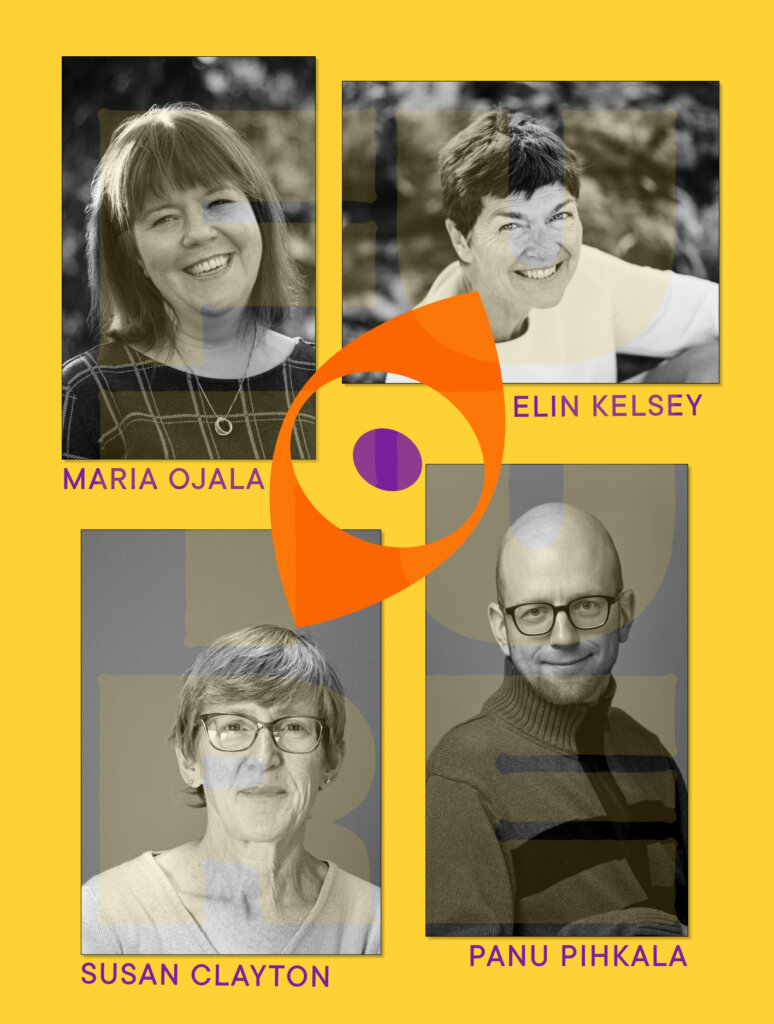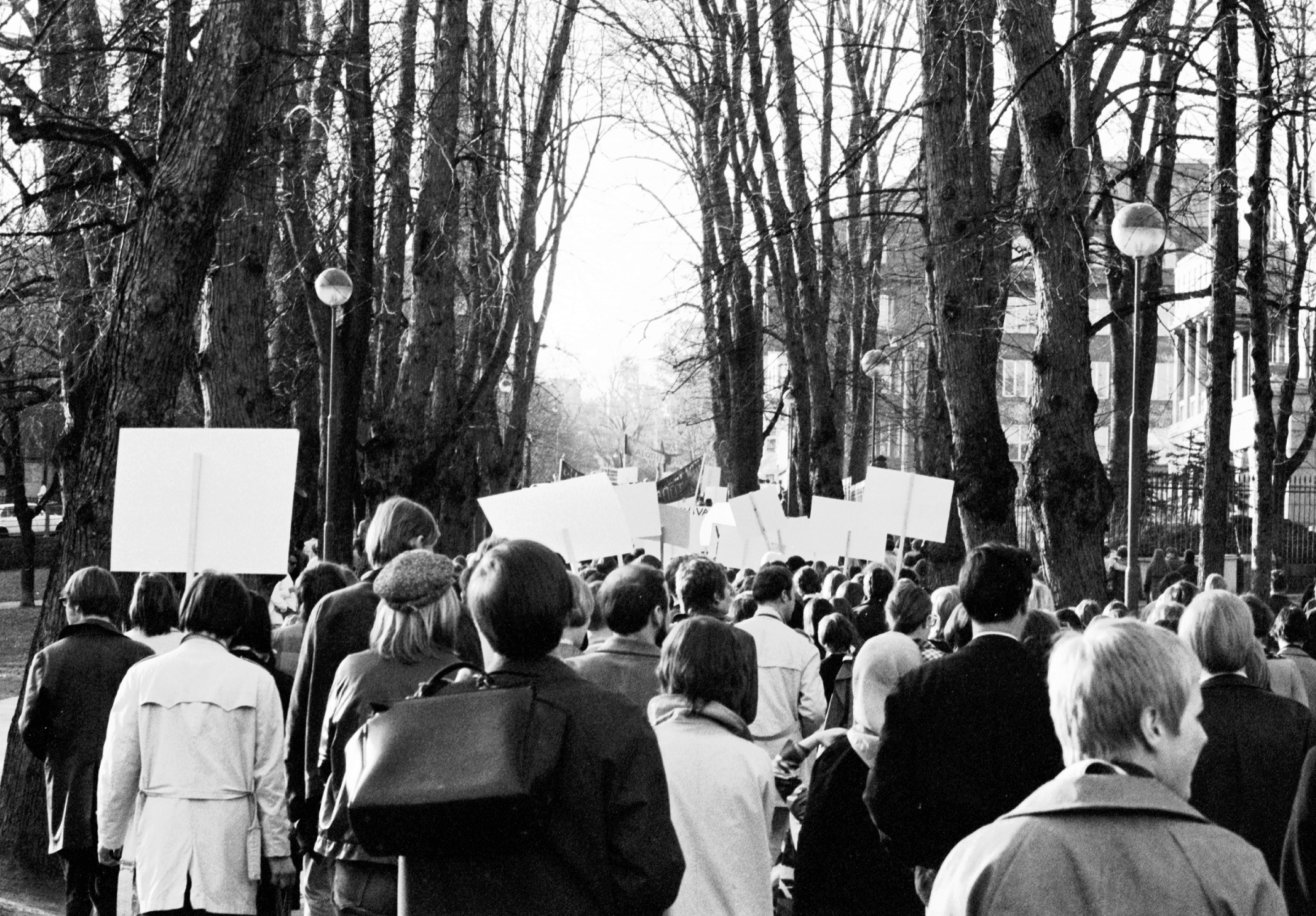Eco-anxiety and eco-emotions
- 22.6.2022 17:30 - 20:00
- Susan Clayton, Maria Ojala, Elin Kelsey & Panu Pihkala
- Register here!
In this event, many leading researchers on eco-anxiety and other eco-emotions will speak about the current state of research and future needs.

Research about eco-anxiety and various other eco-emotions is now growing fast. Please join us for discussion around this crucial topic in Puistokatu 4 stream!
In this event, many leading researchers on related topics will speak about the current state of research and future needs. Prof. Susan Clayton from the US has published many pioneering studies and reports about climate anxiety. Docent and senior lecturer Maria Ojala from Sweden has studied climate worry and hope for about 20 years. Communicator and visionary Elin Kelsey, Ph.D., from Canada has developed educational resources for challenging the narrative of climate doomism and championing solutions journalism. They are hosted by Docent Panu Pihkala from Finland, an interdisciplinary eco-anxiety and eco-emotion scholar.
The discussions will also touch upon practical ideas for encountering eco-emotions constructively in societies, with a certain emphasis on communication and education. The event is part of the cooperation between Ilvies ry, a Finnish organization for environmental communication, and Elin Kelsey, funded by the Kone Foundation.
Research psychologist Kirsti M. Jylhä , Ph.D., will facilitate the discussion together with the help of younger eco-emotion scholars such as Isabel Coppola. Kelsey will join over Zoom while the other speakers will be present in Helsinki.
Registration will be open until Tues 21st June at 14.00 Helsinki time (noon UK time).
A Zoom link will be sent to registered participants. The event will be recorded and the video will be available afterwards.
Information about the speakers
Susan Clayton is Whitmore-Williams Professor of Psychology at the College of Wooster in Ohio. Her Ph.D., from Yale University, is in social psychology. Her research examines people’s relationship with the natural environment, how it is socially constructed, and how a healthy relationship with nature can be promoted, particularly in informal education contexts. She has written extensively about the effects of climate change on mental health, and has developed a scale to assess climate anxiety. She has written or edited six books, including most recently Psychology and Climate Change (2018; co-edited with Christie Manning).
Clayton is a fellow of the American Psychological Association (APA), the Society for Environmental, Population, and Conservation Psychology (SEPCP), the Society for Personality and Social Psychology (SPSP), and the Society for the Psychological Study of Social Issues (SPSSI). In addition to serving as the editor of the Cambridge Elements series in applied social psychology, she is on the editorial boards of the Journal of Environmental Psychology, Social Justice Research, Social Psychological and Personality Science, and the Journal of Zoological and Botanical Gardens. She was a lead author on the 6th assessment report from the Intergovernmental Panel on Climate Change, contributing to the chapter focused on climate change impacts on health and wellbeing. For more information about Susan’s research see her university webpage.
Maria Ojala is senior lecturer (docent) in psychology at Örebro University, Sweden. She has also worked as an assistant professor at the Department of Education, Uppsala University. She has a master’s degree in psychology from Lund University and a PhD-exam in psychology from Örebro University. Maria’s main research interest concerns how young people think, feel, act, learn, cope, and communicate about global environmental problems, with a specific focus on climate change. She is especially interested in the role of meaning-focused coping, critical emotional awareness, and defiant hope in promoting transformative learning, psychological wellbeing, and climate engagement. Maria has performed research with young people about these topics for about 20 years, and her work on these matters has gathered much international attention.
At the moment she is the principal investigator of three projects funded by the Swedish research councils Formas, Forte, and VR. In the fall of 2022 Maria will start a longitudinal study where students are followed through three years during senior high school. The focus will be on climate-change worry, coping, mental wellbeing, communication with parents and teachers, transformative learning, and different kinds of climate-change engagement. For more information about Maria’s research see her university webpage and her LinkedIn page.
Elin Kelsey, Ph.D. is an internationally known expert in environmental communication, education, and advocacy. She has designed several influential campaigns for these aims. Her newest book for adults, Hope Matters: Why Changing the Way We Think Is Critical For Solving The Environmental Crisis was published by Greystone Books in October 2020. Her influence can be seen in the hopeful, solutions-focus of her clients, including the Monterey Bay Aquarium, and other powerful institutions where she has served as a visiting fellow including the Rachel Carson Center for the Environment and Society, the Rockefeller Foundation, and Stanford University in the Graduate School of Education. Kelsey co-created #OceanOptimism, a twitter campaign to crowd-source marine conservation solutions which has reached more than 100 million shares since it launched in 2014.
As an Adjunct Faculty member of the University of Victoria School of Environmental Studies, Kelsey is consulting on the development of a solutions-oriented paradigm for educating environmental scientists and social scientists. Passionate about bringing science-based stories of hope and multi-species resilience to the public, Kelsey is a popular keynote speaker and media commentator. She regularly serves as an author/artist in residence, leading hopeful environmental workshops with kindergarten to university students across North America and around the world, most lately in Helsinki, Finland, in Winter 2022. She is a feature writer and podcast host for Hakai Magazine and a best-selling children’s book author. Her newest book for children, A Last Goodbye was published in April 2020.
Panu Pihkala is an interdisciplinary eco-anxiety scholar based in the University of Helsinki, Finland. He is an adjunct professor (docent) in environmental theology and has researched also the role of worldviews and religions for environmental matters. Pihkala is the leading Finnish scholar in eco-anxiety research and he often comments on related matters in the Finnish media. The international influence of his research has grown during the recent years. His research article “Anxiety and the Ecological Crisis: An Analysis of Eco-anxiety and Climate Anxiety” (Sustainability, 2020), received nearly 10000 full-text reads and over 30 citations in the first year since its publication. In 2021, he joined other scholars such as Susan Clayton in the internationally acclaimed research study “Climate anxiety in children and young people and their beliefs about government responses to climate change: a global survey” (Hickman, Marks, Pihkala, Clayton et al. 2021). Pihkala’s latest research article explores the array of climate emotions (“Toward a Taxonomy of Climate Emotions”, 2022).
Pihkala has published two books in Finnish about eco-emotions, and he was awarded the National Prize for Adult Education (Sivistyspalkinto) in 2018 by The Finnish Lifelong Learning Foundation (Kansanvalistusseura), among other awards. Pihkala has engaged for a long time with education and he has published several articles about eco-anxiety and education. Pihkala is an active member of the international network of Climate Justice educators (www.existentialtoolkit.com), co-facilitated by Elin Kelsey. Pihkala serves as an advisor in many projects, including the Finnish national eco-anxiety project for social and health sectors (2020-).
Kirsti M. Jylhä, Ph.D., is a researcher at the Institute for Futures Studies, Stockholm, Sweden. She received her PhD in psychology from Uppsala University. Her thesis investigated the correlation between sociopolitical ideology and climate change denial. The focus was more specifically on testing which ideological variables help explain the variation in, for example, individuals’ tendency to believe that human activities are causing changes in the climate system and that these changes have negative consequences.
In her current research, she focuses more broadly on climate-related views, emotions, and behaviors. Kirsti is a principal investigator in an international postdoctoral research project ‘Examining and overcoming the psychological barriers to climate action’, funded by the Swedish Research Council. Having a passion for public outreach, she is a founding member and secretary of ILVIES (the Association for Climate and Environmental Communication Science, in Finland) that aims to develop both research and public impact of environmental communication and related fields. For more information about Kirsti’s research see her research institute webpage.




